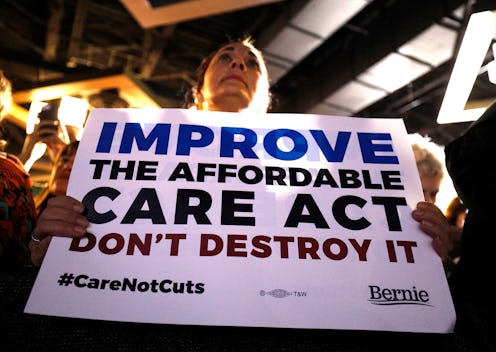Life
This Is How Trump’s Health Care Executive Order Will Affect People With Disabilities

The end of the fiscal year last week finalized the Republican's failure to repeal and replace the Affordable Care Act and, after a long summer chock full of die-ins and marches protesting the Republicans’ proposed health care policies, the disability rights community more than deserved a breather. But only eight days later, on Oct. 12, Trump signed a health care executive order meant to undermine and dismantle Obamacare. According to CNN, the executive order “would allow consumers to buy short-term policies, which don't have to comply with Obamacare's protections for those with pre-existing conditions.” Essentially, with this executive order, many disabled people, and the protections they receive through the ACA, will be seriously impacted.
Trump’s executive order is predicted to be part of a larger plan to gut Obamacare — a plan being called a “synthetic repeal.” The term was coined on Twitter by Andy Slavitt, who served as Acting Administrator for the Centers for Medicare & Medicaid Services during the last two years of Obama’s presidency. Slavitt believes following the Oct. 12 order, the Trump administration will continue to destabilize the health marketplace — without the help of Congress — until the ACA fails. In response to Trump’s executive order and the possible backdoor repeal, Bustle spoke with Stacy Stanford, a disability rights advocate and community organizer who works with Utah Health Policy Project.
Though the executive order and possible “synthetic repeal” will negatively affect many marginalized communities, it poses an especially great risk to people with disabilities. Stanford tells Bustle, “Introducing more options for healthy people to buy less-comprehensive coverage, removed from the protections of the Affordable Care Act, only increases the burden on sick and disabled people.” By effectively giving non-disabled people the choice to buy insurance plans that include less coverage, premiums for disabled people will increase dramatically.
This past summer, experts predicted if repeal and replace was successfully passed, those with pre-existing conditions would face skyrocketing medical expenses — people with kidney cancer could expect a 703 percent surcharge, while those who had a major depressive order would face a 208 percent surcharge. Trump’s health care executive order will create a similar circumstances for the disability community. “Disabled folks cannot shop around for cheaper, skimpier insurance options,” says Stanford. “We must buy plans that cover our care needs, or face losing access to treatment because we cannot afford the soaring costs that will come when healthy people flee the market.” If this happens, many disabled people will not be able to afford health insurance plans, and therefore could face dismal, and potentially fatal, consequences.
When one in five Americans experience mental health issues, the executive order’s possible effect on accessible mental health treatment is particularly alarming. Stanford explains to Bustle, “Nobody is immune to mental illness, and folks who sign up for bare-bones insurance while they are healthy may find themselves in the middle of a psychiatric crisis, without coverage for prescription drugs, hospitalization, or mental health treatment.” Stanford also worries this possible lack of coverage could prove to be life-threatening, especially if a mentally ill person becomes suicidal, yet cannot receive inpatient treatment. The organization Mental Health America swiftly released a statement condemning Trump's executive order, stating that it "falls short" of providing mentally ill people with proper healthcare.
Moreover, Stanford believes the fight for disability rights goes beyond the ACA, and extends to other services that greatly affect the disabled community. “[Our community] must also fight to defend Medicaid against any cuts in pending budget proposals and tax plans,” Stanford explains to Bustle, “as well as state-level threats in the form of work requirements, lifetime limits, and other cruel and arbitrary restrictions.” Trump’s proposed budget plan severely slashes Medicaid, a program that not only benefits disabled people, but women and families.
Though Trump’s executive order is a done deal, Stanford urges people to remember that “this executive order will not go into effect right away, and healthcare.gov will still open as planned.” Yes, this means you can still buy an insurance plan that protects any pre-existing conditions you may have, and guarantees you receive the ten essential health care benefits.
The rest of the “synthetic repeal” is obscured by uncertainty, which makes it difficult for disability advocates to organize actions that subvert or protest the rollback of protections. However, non-disabled people can be allies to the disability community by continuing to educate family and friends on the importance of the ACA. “Non-disabled people need to recognize that health reform designed to be appealing to healthy people could actually be deadly for those of us who are mentally or physically ill,” adds Stanford.
The disability community is quite literally fighting for their lives in our current political climate, so non-disabled people need to step up to the plate, and help disabled advocates fight to keep basic medical protections in place. Disabled people's access to health care should not be treated as a privilege, but a basic right.